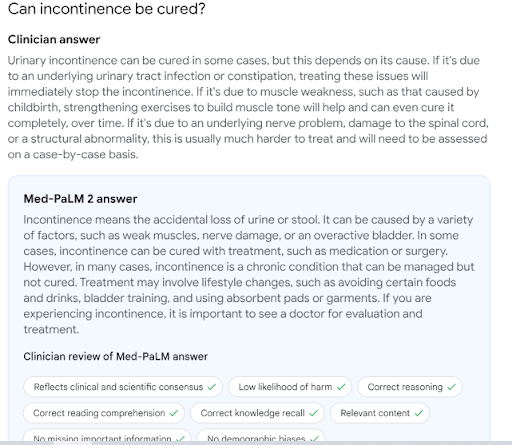
The healthcare sector is at the forefront of technological transformation due to the advancement and utilization of two powerful technologies: artificial intelligence (AI) and machine learning (ML).
Google's groundbreaking AI model, Med-PaLM, is specifically designed and extensively trained for healthcare. Its remarkable capabilities have been showcased through careful evaluations using medical exams, research data, and genuine consumer health questions.
This Google's AI healthcare model essentially serves as your doctor's equivalent of ChatGPT. It possesses the capability to analyze symptoms, X-Rays, and other medical data, providing valuable feedback and insights.
The first version of Med-PaLM was unveiled in late 2022, and its groundbreaking performance earned it a publication in the prestigious scientific journal known as Nature in July 2023.
Med-PaLM became the first AI system to surpass the pass mark on the challenging US Medical License Exam (USMLE) style questions. Expert panels of physicians and users have also endorsed its ability to generate accurate and helpful long-form answers to consumer health questions.
Image Source: Google Research Med-PaLM
Building on the success of Med-PaLM, Google excitedly introduced its latest version, Med-PaLM 2, during the annual health event "The Check Up," held in March 2023.
According to Google, this AI tool will revolutionize the healthcare industry by personalizing medicine, automating tasks, and improving diagnosis for a healthier society.
As Sundar said at Google I/O, the growth of AI is the biggest technology shift we’ve seen. The image below depicts how this enhanced model achieves an impressive 86.5% accuracy on USMLE-style questions.
Image Source: Google Research Med-PaLM

Image Source: Google Research Med-PaLM
Google's AI healthcare model Med-PaLM acts as your doctor's version of ChatGPT, with the ability to analyze and provide feedback on symptoms, X-Rays, and more. A recent peer-reviewed research paper published by Nature has revealed some encouraging results as the model goes through testing:
While the roll-out for testing has been slow and steady, the model could eventually be used in medical settings to provide doctors with an additional source to consult, speed up the process of clinical documents, and provide health care to those who don’t have access to it.
The accessibility of healthcare remains a challenge for many, as it is not affordable to all. However, the introduction of Med-PaLM 2 promises to reduce the expenses associated with diagnosis and healthcare in general, resulting in substantial benefits.
Envision a world where the most exceptional doctors, recognized for their expertise, are available to every person, leading to the potential to save millions of lives. Achieving this remarkable feat necessitates a collaborative effort as well as working in alignment with skilled doctors.
AI is prevailing and is here to enhance the quality of our lives in all aspects. Despite its infancy, it is a knowledgeable machine with the capacity to continuously grow and learn.
We as human beings are its parents and it is up to us to teach it about ethics, morals, compassion, and more.
While Med-PaLM 2 shows great promise, it does face certain obstacles, much like other AI chat models. Listed are the challenges below:
One of the primary areas of concern surrounding Med-PaLM 2 is its current level of accuracy, given that the technology is still in the early stages of development and refinement.
However, Google is actively working on improving the system’s precision to deliver more accurate results in healthcare applications.
Another critical aspect that demands attention is the privacy of health data. Considering the sensitive nature of medical information, safeguarding patient privacy is of utmost importance.
To ensure data security, Google has taken measures to assure clients that they retain control of their encrypted data while testing Med-PaLM 2. This means that Google will not have access to confidential information, offering clients greater peace of mind and protection for their sensitive data.
When utilizing Google’s Med-PaLM 2, obtaining informed consent from patients regarding the collection, storage, and utilization of their medical data becomes crucial.
Building and maintaining trust, as well as fostering patience and understanding, requires a clear and transparent approach to communication. This involves explaining the technology's functionality, potential benefits, and any associated risks to the patients.
Google’s Med-PaLM 2 can only be as unbiased as the data on which it is trained. If the training data used to develop the algorithms contains biases, it may perpetuate existing healthcare disparities and result in discriminatory outcomes.
To ensure equitable and fair healthcare delivery, it is crucial to proactively identify and mitigate biases in the algorithms.
Google's Med-PaLM 2 holds the promise of transforming healthcare by tackling essential challenges encountered by clinics and hospitals across the globe by:
Med-PaLM 2 has a new technology called Large Language Model (LLM), which helps it understand complicated medical data.
It simplifies and improves disease diagnosis and prognosis, assists in precision medicine decisions, supports clinical care, and enhances research activities. Google is testing Med-PaLM 2 on patients of a network of clinics.
Med-PaLM 2 is a new way of doing healthcare that includes personalized medicine, using technology with science, managing healthcare resources better, and helping patients worldwide.
The AI-powered technology is used to obtain answers to medical questions and summarize analyses, records, prescriptions, and other documentation.
Google's AI model, Med-PaLM, is set to revolutionize healthcare. While AI can optimize resource utilization and prevent unnecessary procedures, we also need to ensure that it doesn't compromise the human touch and personalized care that patients value.
With its advanced capabilities, it promises to enhance medical data analysis, diagnosis, and treatment options. Its potential to improve accuracy and efficiency in healthcare systems is immense.
However, ethical considerations, data privacy, and patient consent must be prioritized to ensure responsible and transparent implementation. Embracing this innovation wisely, Med-PaLM could truly transform the future of healthcare.
0 Comment
Your email address will not be published. Required fields are marked *